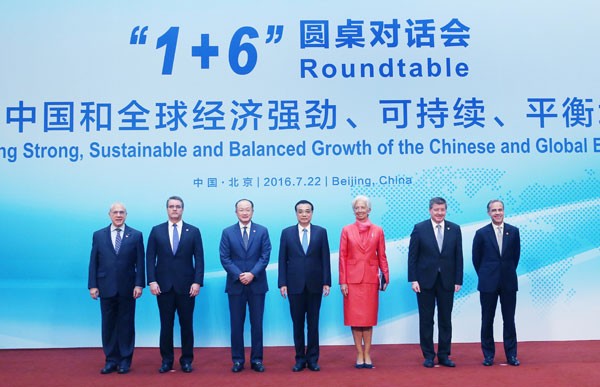
Wall Street Journal writes that a few short months ago, China's economic problems were fueling global panic in markets and drawing unwanted attention and rebuke by the world's largest economies. Now, China's economic challenges have taken a back seat to more pressing geopolitical concerns among finance ministers and central bankers from the Group of 20 largest economies, allowing Beijing to return to the role it prefers: showcasing its growing clout on the world stage. At the conclusion of two days of talks Sunday, the G-20 redoubled calls to use all available policy tools to boost output, wary of mounting headwinds that threaten to tilt the global economy into a low-growth rut. Finance leaders also repeated a commitment to avoid using exchange rates to gain a competitive advantage and vowed to consult closely on exchange-rate policy. International Monetary Fund economists and many G-20 finance chiefs expressed concern that policy makers are relying too heavily on monetary policy to goose growth, calling for more economic restructuring to boost productivity and additional budget stimulus where possible. "Monetary policy alone cannot lead to balanced growth," the G-20 said.
- Reuters reports that China's finance minister Lou Jiwei warned on Sunday that the government cannot easily step in to solve debt problems, but that China does not have systemic regional debt risks despite a few corporate defaults. Lou was speaking at the conclusion of the G20 meeting of finance ministers and central bankers in the southwestern Chinese city of Chengdu. He said the country would take steps to prevent risks involving strategically important financial institutions, and implement both demand-side and supply-side policies - but rely mainly on supply-side reform.
- New York Times reports that Global finance officials promised Sunday to protect the world economy from the shockwaves of Britain's European Union referendum and to boost sluggish growth. Envoys of the Group of 20 major economies also rejected trade protectionism, an issue that has risen in prominence as U.S. Republication presidential candidate Donald Trump stirs unease with talk about restricting access to American markets.The gathering of finance ministers and central bank governors from the United States, China, Britain, Germany and other governments took place against a backdrop of a weak global recovery that was rattled by Britain's vote to leave the EU and trade tension over Chinese exports of low-priced steel. The British vote "increased global economic uncertainty," said a joint statement by the officials, who were meeting in Chengdu in western China." G-20 members are ready to actively respond to the potential economic and financial impact brought by the British referendum," said the statement. "In the future, we hope to see Britain as a close partner of the EU."
- 2016-07-22 Exclusive: Top Obama aide to take call for South China Sea calm to Beijing
- 2016-07-21 China's Calls for South China Sea Talks Face Challenges
- 2016-07-20 Top US admiral says China exchanges conditional on safety
- 2016-07-19 Philippines says it rejected China offer of talks on South China Sea
- 2016-07-18 China to Close Part of South China Sea for Military Exercise
- 2016-07-17 China's urban air quality improves in first half - ministry
- 2016-07-15 China media again touts plans to float nuclear reactors in disputed South China Sea
- 2016-07-14 China’s actions in South China Sea seen as defying ruling
- 2016-07-13 China on Pace to Meet Economic Targets This Year, Premier Says
- 2016-07-12 Beijing’s South China Sea Claims Rejected by Hague Tribunal
- www.bbc.com UK explores multi-billion pound free trade deal with China
- Bloomberg China Seeks Intensified Coordination But U.S. Is Playing It Cool
- www.bbc.com South China Sea: Asean deadlock after court ruling against China
- Wall Street Journal As China Juggles Its Yuan Moves, the World Is Taking Note
- Wall Street Journal G-20 Ministers Renew Vow to Promote Growth After Brexit Shock
- The Washington Post China suspends 4 local officials after deadly floods
- Reuters US Treasury's Lew says discussed global excess capacity with China
- Wall Street Journal China Drivers Find Advertised Fuel Economy a Fiction
- Wall Street Journal Asean Looks for Wiggle Room to Skirt South China Sea Impasse
- San Francisco Chronicle China rolls out world's largest amphibious aircraft
- Fox News India asks 3 Chinese journalists to leave country
- New York Times Tiger Mauls Woman to Death in Chinese Wildlife Park
- New York Times ASEAN Split on How to Deal With China in South China Sea Row
